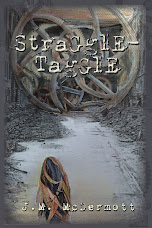Understanding Genre/Literature Division with Help from Immanuel Kant
I was thinking about the divided response that I'm seeing to my book in the sci-fi/fantasy community, and about how I'm straddling this line between literature and fantasy. Where exactly is the line?
Okay, here's what I came up.
First, remember Kant's Categorical Imperative?
"One should never act excepting that one's action should become a universal law", in my text's version of the translation.
Here's a great little way to summarize how I approach writing:
"One should never write excepting that one's writing should become a universal law."
Okay, how do we understand genre versus literary with the help of our new writing imperative?
In genre literature, an audience seeks their preconceived notion of a book, and measure a book as how near or far that book falls from the audience ideal. Thusly: "One should never write excepting that one's writing fits the existing universal law."
In literary fiction, the audience seeks to explore new notions of book, and what a book can be and do and convey. The measure of a great work of literature can be found in the influence it exerts upon subsequent books, like digging a canal out from the river, and feeding the digging of other canals. Even a subtle expansion of the possible can have a massive influence on the flow of words.
Or, expressed thusly: "One should never write excepting that one's writing should become the universal law."
Writing is an act. As an action, following Kant's moral imperative, one should only write when one's writing alters the shape of all writing, and creates a new field of writing. That is the moral writing. The other kind is not necessarily bad, but not necessarily good, either.
Following this new genre versus literary law is utterly impossible if you believe the marketing boundaries placed upon us by bookstores and librarians. Plenty of form-fitting, workmanlike writing exists under Literature/Fiction. Plenty of mind-expanding fiction exists under "Mystery", "Horror", and "Sci-Fi/Fantasy".
The dissonance between the marketing distinction and the Kantian distinction indicates the boundary we must straddle.
The marketing labels place my books next to Jack McDevitt. I actually like Jack McDevitt's books. They're lots of fun, and full of exciting space battles and weird planets, and interesting plot twists. However, Mr. McDevitt's books follow the genre categorical imperative. I have yet to find anything truly new or groundbreaking in a McDevitt book. He is my neighbor, per the laws of marketing.
My book follows the literary categorical imperative.
Thus, folks who look for Jack McDevitt might accidentally pick up my book, and check it out, and discover that I'm not really part of their genre. (Thus, why some reviewers felt I was doing something wrong in my book. Namely, I wasn't writing their book. I was writing mine. Reading my book looking for "fantasy done right", as one commenter has stated, is never going to work. I'm, in fact, actively trying to do fantasy wrong, with loud bells and a giant marching band and a dancing monkey. I want to do it wrong, wrong, wrong!)
Also, folks perusing Alice McDermott's books, and Cormac McCarthy's will also fail to discover my book. Cormac follows the literary categorical imperative, that I can tell. Alice follows her own marketing zone's genre imperative, that I can tell. People actively seeking new works of groundbreaking fiction following the literary categorical imperative are out of luck, unless someone tells them and guides them beyond the marketing distinctions.
Without acceptance of the Kantian categorical distinction, how do we, as writers re-design the genre divide in the mind's of readers? People searching for either the former categorical distinction (genre) and people searching for the latter literary distinction (a.k.a. Kantian categorical imperative of literature) are both missing out on books and stories we'd love. Genre readers are being told to adore books by reviews, and falling down a rabbit hole of writing they don't desire. Literary readers are urged to adore the next big thing, and discover writing that just isn't up to snuff.
And people like me, that read both with equal veracity (though I write only the literary stuff at this time)?
Well, I'm fine, actually. I'm good at exploring, and I can easily accept a book for what it attempts instead of what I want it to attempt.
I'm not complaining, actually, because I'm perfectly fine. I'm just observing, and thinking about the system in place, and how it works, and where it breaks down.
That's what I'm thinking about right now.
Anyone have any thoughts?














1 comment:
Word, dude. Word.
Post a Comment